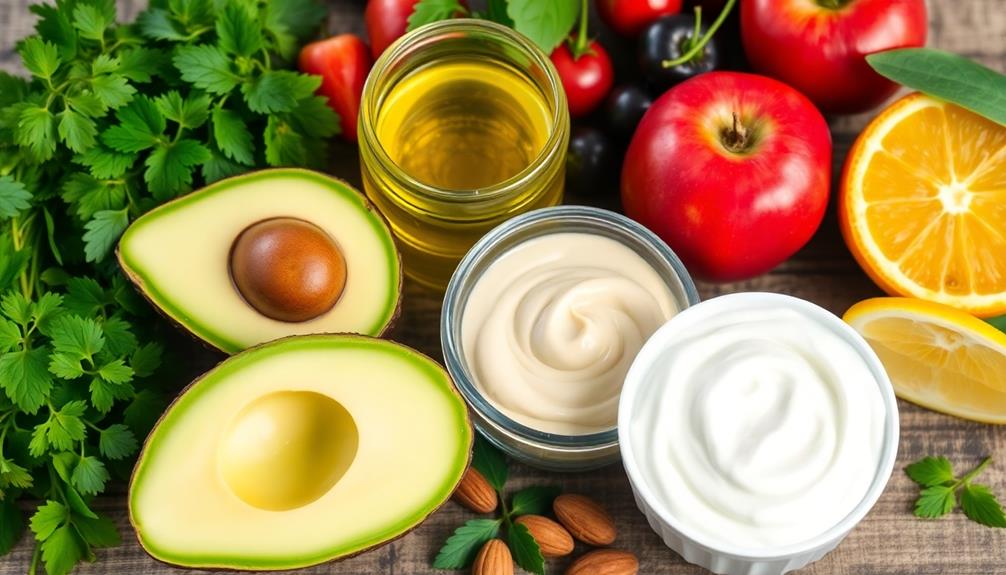You can easily swap butter for heart-healthy substitutes that keep your meals delicious and nutritious. Olive oil offers a rich source of monounsaturated fats, while avocado gives you creaminess without the saturated fat worries. Greek yogurt adds protein and moisture, making it perfect for baked goods. Don't forget about applesauce for natural sweetness and lower calories, or nut butters for flavor and healthy fats. Coconut oil is versatile and can replace butter in a 1:1 ratio. Experiment with these options to elevate your cooking and discover new flavor combinations that will surprise your taste buds.
Key Takeaways
- Olive oil is a heart-healthy alternative, rich in monounsaturated fats and antioxidants, effective for reducing bad cholesterol levels.
- Avocado can replace butter in a 1:1 ratio, offering a creamy texture and healthy fats without saturated fat drawbacks.
- Greek yogurt serves as a lower-fat substitute, enhancing dishes with protein and creaminess, ideal for baking and savory recipes.
- Applesauce adds natural sweetness and moisture to baked goods, providing a lower-calorie option while increasing fiber content.
- Coconut oil, with its medium-chain triglycerides, can replace butter in a 1:1 ratio, suitable for various cooking methods and shelf-stable.
Understanding Saturated Fats

Often overlooked, saturated fats play a significant role in your overall health. You might associate them with unhealthy eating habits, but it's crucial to understand their complexities. Saturated fats are primarily found in animal products such as meat and dairy, as well as some plant oils.
While it's true that excessive consumption can lead to heart disease, your body needs a certain amount for peak functioning.
Moderation is key. Saturated fats can provide energy and help your body absorb vital nutrients. They also support cell structure and hormone production. However, be mindful of the sources. Whole foods like coconut oil and dark chocolate can offer health benefits when consumed in moderation, unlike processed foods that may contain unhealthy additives.
You should focus on balancing your intake of saturated fats with healthier unsaturated fats, which can be found in foods like nuts, seeds, and olive oil.
Avocado as a Substitute

Avocado serves as an excellent butter substitute, bringing a creamy texture and rich flavor to various dishes. It's packed with healthy fats that can enhance your meals without the drawbacks of saturated fats found in butter.
Additionally, avocados are rich in vitamins and minerals beneficial for overall health, making them a nutritious choice for your recipes. When you're baking, simply mash ripe avocado and replace it for butter at a one-to-one ratio. You'll notice a subtle avocado taste, which works well in chocolate recipes, muffins, and brownies.
In spreads, you can use mashed avocado instead of butter on toast or sandwiches for a heart-healthy option. It's not just nutrient-dense; it also adds a vibrant color and freshness to your meals.
If you're preparing salads or dips, blending avocado into dressings or guacamole gives a creamy consistency without the heaviness of butter. Plus, incorporating healthy fats like those found in avocados can enhance energy levels and reduce fatigue, supporting overall well-being.
Greek Yogurt Alternatives

Greek yogurt is an excellent butter substitute that packs a nutritional punch.
You can enjoy its creamy texture and tangy flavor in both cooking and baking, making it a versatile choice.
Let's explore how it can enhance your meals while keeping them heart-healthy.
Nutritional Benefits Explained
When you're looking to swap out butter for a healthier option, Greek yogurt stands out as a versatile alternative packed with nutritional benefits. This creamy delight is rich in protein, providing about twice the amount found in regular yogurt. That protein helps you feel full longer, making it easier to manage cravings and maintain a healthy weight.
Additionally, incorporating healthy oils into your diet can complement the benefits of Greek yogurt, enhancing your overall wellness and essential oils for health.
Greek yogurt also boasts lower fat content than butter, considerably reducing your intake of saturated fats, which can contribute to heart disease. Plus, it's a great source of calcium, essential for bone health, and it contains probiotics that support digestive health. These live cultures can boost your immune system and promote a healthy gut.
Another advantage is its versatility; you can use Greek yogurt in both savory and sweet dishes. It can add creaminess to recipes without the added calories of butter, making it a smart choice for those looking to enhance their meals while prioritizing their health.
Incorporating Greek yogurt into your diet not only helps you cut back on unhealthy fats but also enriches your meals with essential nutrients, promoting overall well-being.
Cooking and Baking Uses
One of the best ways to incorporate Greek yogurt into your cooking and baking is by using it as a direct substitute for butter in many recipes. You can easily replace half the amount of butter with Greek yogurt, which reduces calories and saturated fat while adding a creamy texture. This works particularly well in recipes for muffins, cakes, and pancakes, where moisture is key.
Additionally, understanding how to adapt your cooking methods to different dietary preferences can enhance your culinary skills and appeal to a broader audience, reflecting the importance of cultural intelligence in global business.
When you're making savory dishes, like mashed potatoes or creamy sauces, Greek yogurt can also shine. It provides a tangy flavor and a smooth consistency without the added fat. Just swap out butter for Greek yogurt in your favorite recipes, and you'll enjoy the same comforting taste with added health benefits.
Don't forget about baking cookies! Using Greek yogurt not only keeps them moist but also enhances the nutritional profile. Just remember to adjust the dry ingredients slightly, as yogurt adds extra moisture.
Olive Oil Benefits

Olive oil stands out as a top choice for heart-healthy cooking, thanks to its rich content of monounsaturated fats and antioxidants. These healthy fats can help reduce bad cholesterol levels, lowering your risk of heart disease. When you swap butter for olive oil, you're not just enhancing flavor; you're actively supporting your heart health.
In addition to its heart benefits, olive oil is packed with antioxidants, particularly vitamin E and polyphenols. These compounds help combat inflammation and oxidative stress, promoting overall health. Using olive oil in dressings, marinades, or sautéing can elevate your meals while contributing to your well-being.
Another advantage of olive oil is its versatility. Whether you're drizzling it over veggies, using it in baking, or frying, it adapts beautifully to various cuisines. Plus, its distinct flavor can enhance your dishes without overwhelming them.
When choosing olive oil, opt for extra virgin quality for maximum health benefits. It's less processed and retains more nutrients. Remember to store it in a cool, dark place to maintain its quality.
Nut Butters for Flavor

Adding nut butters to your meals can elevate both flavor and nutrition effortlessly. Whether you're spreading it on toast, stirring it into smoothies, or using it in sauces, nut butters pack a punch of taste and health benefits. Almond, peanut, and cashew butters not only provide rich, nutty flavors but also deliver healthy fats, protein, and essential vitamins.
You can easily enhance your breakfast by mixing a spoonful of almond butter into your oatmeal or yogurt. This simple addition adds creaminess and a satisfying taste that'll keep you full longer.
For lunch, try a peanut butter drizzle on your salad; it pairs wonderfully with a tangy vinaigrette, adding depth to every bite.
If you're preparing snacks, nut butters are perfect for dipping fruits or spreading on whole-grain crackers. Their versatility makes them a go-to option for boosting flavor in a heart-healthy way.
Just be mindful of portion sizes since they're calorie-dense. With a bit of creativity, you can incorporate nut butters into your meals, making them not only tastier but also more nutritious.
Applesauce for Sweetness

Nut butters bring a wealth of flavor to your meals, but if you're looking for a lighter alternative that still satisfies your sweet tooth, applesauce is a fantastic choice.
It's not only lower in calories and fat, but it also adds natural sweetness and moisture to your recipes. You can easily swap applesauce for butter in baked goods like muffins, cakes, and cookies, usually in a 1:1 ratio. Just keep in mind that using applesauce might make your treats denser, so adjust your baking time accordingly.
When you use unsweetened applesauce, you're cutting down on refined sugars while still enjoying a hint of sweetness. Plus, it's a great source of fiber and vitamins, making your meals more nutritious.
You can also blend applesauce into oatmeal or smoothies for added sweetness without the need for extra sugar.
If you're experimenting with savory dishes, consider adding a spoonful of applesauce to marinades or sauces for a subtle sweetness that balances flavors.
With its versatility and health benefits, applesauce is an excellent choice for those wanting to cut back on butter while still enjoying delicious meals.
Coconut Oil Options

When you're looking for a heart-healthy butter substitute, coconut oil can be a fantastic option. It's rich in medium-chain triglycerides (MCTs), which may help support heart health and boost metabolism. Plus, it adds a delightful flavor to your dishes.
Whether you're baking, sautéing, or spreading, you can easily incorporate it into your cooking.
Here are some benefits of using coconut oil:
- Heart Health: MCTs can improve cholesterol levels, potentially reducing heart disease risk.
- Versatile: Use it in baking, frying, or as a spread for a tropical twist.
- Natural Sweetness: It enhances flavors without needing additional sweeteners.
- Vegan-Friendly: Perfect for those following a plant-based diet.
- Shelf-Stable: Unlike butter, coconut oil doesn't require refrigeration.
When substituting, remember that solid coconut oil typically equals a 1:1 ratio for butter. Melt it for a smoother blend in recipes, or use it straight from the jar for baking.
Enjoy the health benefits and unique taste coconut oil brings to your meals!
Frequently Asked Questions
Can I Use Margarine Instead of Butter for Heart Health?
Yes, you can use margarine instead of butter for heart health. Just choose a soft, trans-fat-free variety. It often contains healthier fats, which can help reduce cholesterol levels and support your overall heart wellness.
How Do I Choose the Best Butter Substitute for Baking?
When choosing a butter substitute for baking, consider flavor and texture. Oils can create moistness, while applesauce adds sweetness. You'll want to balance health and taste, ensuring your baked goods remain delicious and satisfying.
Are There Any Vegan Butter Alternatives Available?
Yes, there are plenty of vegan butter alternatives available! You can try coconut oil, avocado, or cashew cream. These options work well in baking and cooking, providing great flavor and texture without any dairy.
What Is the Best Way to Store Butter Substitutes?
To store butter substitutes, keep them in airtight containers. Refrigerate to maintain freshness, and if you're using a vegan option, check for specific storage recommendations. Always label and date to monitor freshness effectively.
Can I Mix Different Substitutes for Better Flavor?
Absolutely, you can mix different substitutes to enhance flavor! Experiment with combinations like olive oil and avocado or yogurt and applesauce. Just remember to adjust measurements to maintain consistency in your recipes. Enjoy the creativity!
Conclusion
Choosing heart-healthy butter substitutes is like opening a door to a vibrant garden of flavors and health. By swapping out saturated fats for nourishing alternatives like avocado, Greek yogurt, or olive oil, you're not just cooking—you're crafting a masterpiece that fuels your body and delights your taste buds. Embrace these options, and watch your meals transform into a symphony of health and taste, nourishing your heart and soul with every bite.










